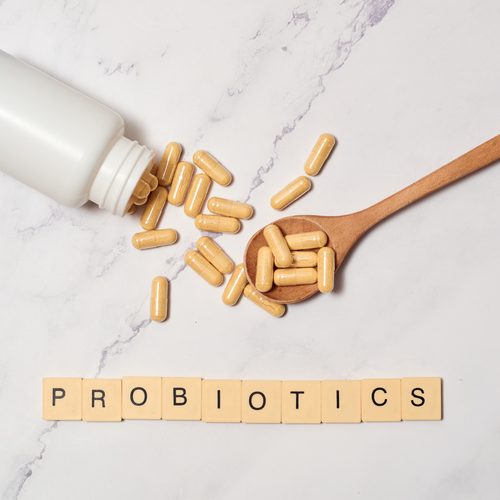What to remember:
Probiotics are live microorganisms (bacteria or yeast) that, in sufficient quantities, confer a health benefit to the host.
Only one health claim is authorized by European regulations: “contributes to the balance of intestinal flora”.
Choose clear, well-dosed formulas , with sufficient dosage and containing recognized microbiological genera such as Lactobacillus, Bifidobacterium or Saccharomyces.
Follow the storage instructions (refrigerated or at room temperature depending on the technology used) to ensure the viability of the microorganisms until consumption.
Beware of overly promising marketing messages : a sober, regulatory and transparent message is a guarantee of seriousness.
Probiotics are among the increasingly popular dietary supplements. But between the many available products and sometimes unclear marketing messages, it's not always easy to navigate. Before we look at how to choose the right ones, let's first take a quick look at the gut microbiota and what happens when it loses its balance.
The intestinal microbiota: a key ecosystem for your health
Our intestines are home to billions of living microorganisms: bacteria, yeasts, harmless viruses, etc. This group forms what we call the intestinal microbiota.
It plays an essential role in digestion, the production of certain vitamins and the overall balance of the body.
When this balance is disturbed – we then speak of dysbiosis – certain families of bacteria become too numerous while others are missing.
This can be related to diet, stress, medications (such as antibiotics ) or even an unbalanced lifestyle.
Dysbiosis can have consequences on digestive comfort, but also on other aspects of health.
This is where probiotics can play a role: by providing live microorganisms, they help support and rebalance the intestinal flora.
What are probiotics?
According to the joint definition of the World Health Organization (WHO) and the Food and Agriculture Organization of the United Nations (FAO), adopted by ANSES (French Agency for Food, Environmental and Occupational Health and Safety): “Probiotics are live microorganisms which, when administered in adequate quantities, confer a health benefit on the host.”
In other words, these are beneficial bacteria or yeasts, naturally present in our intestinal microbiota, which contribute to the good balance of our digestive flora when they are provided as a supplement.
The best known are:
-
Lactic acid bacteria, such as Lactobacillus or Bifidobacterium ;
-
The yeast Saccharomyces boulardii .
3 tips for choosing the right probiotics
With so many options available, here are the essential criteria to check before choosing your probiotics.
#1 - A formulation adapted to intestinal balance
Ideally, you should choose supplements containing well-characterized microorganisms: generally, the name of the strain (i.e. the precise “identity card” of the microorganism) is indicated, which allows you to refer to specific scientific studies.
It is important to select scientifically documented strains, as this guarantees that they have been the subject of serious and recognized studies.
Even if the precise strain is not always communicated (this is the case in many laboratories), it is important that the supplement contains microorganisms recognized as probiotics by the authorities: lactic bacteria (such as Lactobacillus or Bifidobacterium ) or probiotic yeasts ( Saccharomyces ).
At DIJO, the probiotics used belong to the most studied microbiological genera, selected specifically for their action on the intestinal flora.
#2 - Sufficient concentration
A suitable probiotic should provide a minimum amount of live microorganisms. The general recommendation is approximately 1 billion CFU per day (or 10⁹ colony-forming units).
This dose ensures that enough bacteria reach your gut to affect the flora. Below this dose, the amount is often considered insufficient to hope for an effect on the intestinal flora.
At DIJO, we've chosen to go far beyond that: 28 billion CFU per day. This high concentration maximizes the likelihood that bacteria will reach your gut alive and can support the balance of your intestinal flora.
Always check that the CFU quantity is clearly indicated on the label.
#3 - Manufacturing process, stability and conservation
Since probiotics are living microorganisms, their stability depends on storage conditions.
-
Some need to be kept in the refrigerator;
-
Others can remain at room temperature thanks to microencapsulation or lyophilization technologies. At DIJO, we have opted for very low-temperature lyophilization, also known as freeze-drying. This method, which is more efficient than aerosol drying (often used for economic reasons), effectively concentrates probiotics while keeping them in a resting state in a stable and controlled environment—thus ensuring their viability until setting.
Always follow the manufacturer's instructions to ensure the proper storage of probiotics until final consumption.
DIJO probiotics: a clear and responsible positioning
Our probiotics combine 8 carefully selected bacterial species (from the genera Lactobacillus , Bifidobacterium and Lactococcus ), compared to 4 on average in the majority of formulas on the market.
Each capsule provides 14 billion CFU, or 28 billion CFU per recommended dose (2 capsules) — one of the highest concentrations on the market, where dosages often hover around 10 billion.
We remind you that this choice of a high CFU intake aims to maximize and optimize the contribution of our probiotics to the balance of the intestinal flora.
Also, even if the precise strains are not indicated by the manufacturer, our positioning remains faithful to European regulations and based on the contribution to the balance of the intestinal flora.
Our commitments:
-
A simple and relevant formulation;
-
An adapted dosage (2 capsules per day);
-
Optimal storage in the refrigerator;
-
A regulatory and transparent discourse.
To give you a clear picture of what sets DIJO Essential Probiotics apart from other common formulas, here is a summary comparison that highlights our formulation and quality choices.
|
Criteria |
The essential DIJO Probiotics |
Market average |
|
Number of species |
8 bacterial species (from the genera Lactobacillus, Bifidobacterium, Lactococcus ) carefully selected |
About 4 species on average |
|
UFC concentration |
28 billion CFU per daily dose (2 capsules) |
Approximately 10 billion CFU per dose |
|
Origin and choice of genres |
Microbiological genera among the most scientifically studied |
Variables, sometimes without clear indication |
|
Manufacturing process |
Freeze-drying at very low temperature for optimal preservation of live bacteria |
More frequent spray drying (less efficient) |
|
Conservation |
Refrigerate to ensure viability until setting |
Room temperature or cool depending on the product, sometimes without precise indication |
|
Transparency |
Sober speech, in accordance with European regulations |
Allegations sometimes vague or inconsistent |
|
Formulation |
Simple, without unnecessary excipients, adapted dosage (2 capsules/day) |
Sometimes complex or under-dosed |
|
Positioning |
Strict compliance with regulations |
Variable quality and regulatory compliance |
In summary : DIJO Essential Probiotics stands out for the quality of its formulation and the rigor of its manufacturing, to offer you reliable and regulatory-compliant support, far from the excessive promises that are sometimes found on the market.
The regulatory framework: only one authorized health claim
In Europe, probiotics are considered dietary supplements. Their role is simply to supplement the diet, not to treat or cure a disease.
European law very strictly regulates what can be said about them. Today, only one sentence (called a health claim) is officially authorized to describe their effect:
“Probiotics contribute to the balance of intestinal flora.”
This means that any other claims—for example, saying they “boost immunity,” “improve transit,” or “relieve bloating”—are prohibited unless the EFSA (European Food Safety Authority) has validated them for a specific strain. And this validation is very rare, as it requires a lot of solid scientific studies in humans.
In short : if a product makes health promises that are too good to be true, boasting health benefits that are too specific or too "salesy," there is a good chance that it will not comply with the regulations.
Let us remember that at DIJO, we have chosen a sober and transparent approach: our probiotics are presented solely as support for the balance of intestinal flora, in full compliance with European regulations.
Conclusion
Given the diversity of products available, choosing your probiotics can seem complex. By keeping in mind the essential criteria—the presence of recognized microorganisms, the appropriate dosage, compliance with regulations, and appropriate storage conditions—you can make an informed and responsible choice.
Also keep in mind that probiotics, like any other dietary supplement, are not miracle solutions: they are above all a support for the proper balance of your intestinal flora, as part of a varied and balanced diet.
At DIJO, we have chosen to formulate our probiotics in a simple, transparent manner that complies with European requirements, in order to offer you reliable support on a daily basis.
Sources :
[1] Anses, Effects of probiotics and prebiotics on the flora and immunity of adult humans - Summary of the report, 2005, consulted from: https://www.anses.fr/fr/system/files/NUT-Sy-Preprobiotiq.pdf
[2] Economie.gouv.fr, Nutritional and health claims: don't be fooled!, 2024, consulted from: https://www.economie.gouv.fr/dgccrf/les-fiches-pratiques-et-les-faq/allegations-nutritionnelles-et-de-sante-ne-vous-faites-pas
[3] EFSA, Nutrition and Health Claims, accessed from: https://www.efsa.europa.eu/fr/topics/topic/health-claims
[4] Anses, Food supplements, the need for informed consumption, 2025, consulted from: https://www.anses.fr/fr/content/les-complements-alimentaires-necessite-dune-consommation-eclairee













